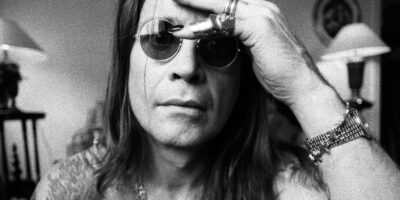When I think of New England independent music, one of the first things that comes to mind is the record label Disposable America. As an almost comically avid fan of the Boston indie rock scene, it is easy to trace many of my favorite albums from the Northeast back to Dustin J. S. Watson’s meticulously curated passion project. I had the pleasure of picking Dustin’s innovative mind about collaboration between tape labels, throwing rock concerts in classrooms, and using Twitch as a way to talk over sets without being uncouth.
What led you to the idea of starting a record label? Is Disposable America the first label you’ve worked for?
Dustin J. S. Watson: Yeah, it’s the first label I’ve been involved with. When I was in college I wanted to be active in the music scene. I was booking shows through my school on campus and in friends’ basements here in Boston and wanted to get more hands-on than that, but I wasn’t in a band and I didn’t play or create music of my own, so it was my way to be involved.
Where did you go to college?
DW: I went to Emmanuel College in Boston.
Are you originally from Boston?
DW: I moved from Maine to Massachusetts when I was 18 for college.
How did you get involved with the music scene at your college? College radio or just going to shows?
DW: Yeah, college radio primarily. There were a few other organizations on campus that would book shows but it wasn’t really anything of a likemind, I guess. So radio was my way to push my way around and the ability to book shows on campus. So me and my friends were able to find DIY in the city that way a little bit just by having access to a venue and by bringing the bands we wanted to see to campus. And then beyond that I was able to meet people that were not involved directly. Like, not classmates from my school. The city’s scene in general.
What was your favorite show you ever booked in college?
DW: I booked this band called Dr. Manhattan and we had this local band called Frogball open—I just remember the band Dr. Manhattan, who were the touring band, the lead singer would multiple times during the set leave the stage and run out through the quad and around the modular unit and back into the building. It was pretty wild to see those bands play in a place where I would have class or student government meetings, generally.
Yeah, I definitely went to those shows in college and they’re always kind of the most fun. I feel like you go into, like, Food Science class two days later and you’re like, “I pulled my ankle moshing in this room.”
DW: Hell yeah! Nice.
It’s good to have rock and roll memories in the same place you’re trying not to fail science class.
DW: Yeah! My school was right in the heart of where a bunch of other Boston colleges exist and MassArt was kind of the place to get really good hardcore or punk or noise shows in very unusual places like small classrooms and the gym, so I tried to compete and EC was really strait-laced and either didn’t know anything about what we were getting away with or frowned upon it when they did know. They didn’t really give the radio club much budget or much wiggle room, but we took advantage of what we could.
I definitely can relate through my own little college radio struggling experiences. So, how does being based in Allston play into your ethos as a label? Do you think you tend to gravitate towards New England artists or do you feel like Disposable America has a national identity?
DW: That’s a hard thing to say because we definitely do have strong roots here in Allston. I started with a lot of Boston artists and have tried to spread out both geography and genre-wise. But I still feel like we very much are a Boston label and every once in a while I realize there are people that don’t associate us with New England or the city at all because they know us through a band from Los Angeles or a band in Portland or something.
So similarly, I’m from Virginia and I saw that last year you put out a tape by Ty Sorrell who is one of my favorite rappers from where I grew up. They’re sick. Is that aesthetic divergence a rare thing or do you expect to have more multi-genre releases on Disposable America that stray from the more indie side of things?
DW: I would love for that to kind of be the pivot moving forward. No knock against indie rock, and I feel like we’ve always dabbled a little bit cross-genre, but I don’t want to get pigeonholed and I want to keep the label fun for me personally. Really just putting out anything interesting is kind of priority for me at this point even if it might not be in line with some chunk of the other releases that people know us for. I was really fortunate to work with Citrus City and Ty on AT GOD’S HOUSE
Yeah, I was going to ask about the Citrus City collaboration. How did that come about? We love Manny (Lemus, Citrus City founder) here at Merry-Go-Round. That was one of my favorite interviews I’ve ever done for Label Maker. How did you end up collaborating on that tape? On top of that, what does it even mean for two labels to collaborate on a release?
DW: The Citrus City interview is actually how I was introduced to Label Maker! I love Manny and met Manny years ago on a tour with Horse Jumper Of Love and Soft Fangs. We’ve kind of just been co-pilots in navigating being cassette labels. We both popped up and started our labels around the same time. Manny and I seem to be pretty similarly minded in our ethos and just our interest in why we want to run labels. Also, in our capabilities. We had been talking about wanting to do a collaboration since we met and this was just the first time that it finally happened. I really loved Ty’s EP CHAI based on Manny’s recommendation and had reached out to them about putting out something new and we brought in Manny on that.
As far as what it means for two labels to collaborate or co-release something, it really depends on the release and the arrangement with the label. We’ve put out a few with different labels over the years and sometimes it just means we simply share in the cost of putting out the tape and in, like, wrangling press for it and reviews. Other times it can be a little bit more involved with like, licensing a contractual negotiation or something.
What other labels have you worked with in the past?
DW: I’ve worked with Topshelf Records, Forged Artifacts, Native Sound, and a few other labels over the years, in different capacities.
So when you tour with a band like Horse Jumper Of Love, what are you doing with them generally?
DW: I was doing merch for both Horse Jumper and Soft Fangs on that tour and helping to drive the van. I’m pretty involved with filling in where a band might need something, so I might help with flyer-making or with booking shows when I can. And so the opportunity to go on tour with those bands was that I happened to be free at the time and knew that I could help them along the way by being there.
How long do you follow bands before you sign them? Do you generally reach out to bands or do they come to you? What is your gut instinct when you decide to sign a band to Disposable America?
DW: That’s kind of all over the place and has varied from band-to-band. Some like Infinity Girl, I was a massive fan of them here for years. When I saw that they had a new album coming out now that they weren’t a Boston band anymore, I decided to reach out kind of like a fanboy and ask if they’d like to work together. Sometimes a release comes as a blind submission like from the band Soft Blue Shimmer. I hadn’t heard of them before. They were a brand new band from the other coast and they sent their first EP and immediately I heard it and was, like, “Let’s work together.” And then sometimes it just happens to be that through booking a band here in Boston or helping set up a show in a different city I strike up a familiarity with them and they pass me a new record and we start talking about working together that way.
So, I’m an indie artist whose long term goal would be to release records through a label like Disposable America. What would your advice be to me, as an artist, to end up on a label like yours?
DW: Beyond, like, the quality of the music itself? For a label like mine, that’s pretty much the number one factor is just my own personal interest in it. Beyond that, it’s just really nice when a band sends a personal email and I can tell they’re reaching out to me because they genuinely want to work with my label since we have a personal relationship with the bands we work with. It’s nice to know that the artist is a real human being on the other end of every email. Knowing how seriously you take yourself as an artist, any aim that you have for the record. All of those are things that I can consider, but primarily it’s whether or not you have a record that I hear and am immediately, like, “This is something that I need to help get out there.”
How many submissions do you think you receive in, say, a month?
DW: It depends on the month. Sometimes it’s a dozen, sometimes after we get a good piece of press or after a fresh release comes out we can get 50. I try to absorb everything and get back to every band that hits us up when I can, which can be a daunting task. But, like I said, sometimes I do get that blind submission that I need to drop everything and take that record on.
What’s the latest record you found as a blind submission that you ended up putting out?
DW: Pure blind submission? Let’s see. A lot of our releases are just me scouting. It’s very rare that I put something out as a blind submission. So besides Soft Blue Shimmer, it was probably the band Groupie? We put out their Validated EP in 2018, but I hadn’t heard of them before getting their email.
So, I have wanted to start a label for many years, but I was making just above minimum wage and am now unemployed. I’ve definitely looked into the financial realities of starting a label and realized it couldn’t be for me. If I may ask, how did you fund your early releases?
DW: Everything continues to be and always has been a cycle that’s kind of self-contained. It’s why I dabble largely in cassette tapes, but everything is an endless ecosystem of one release helping to fuel momentum for the next release.
Is Disposable America your full-time job or is it just a side hustle for you?
DW: It’s both a full-time job and a side hustle. I have a 9-5 regular job and always have since I’ve run the label, though that has changed over the years. The label is definitely a full-time time commitment. I’m the only one that “is” Disposable America, though sometimes the bands help. But I do 100% of our mail order, I do a lot of our design work, I do most of our pitching for press and PR. I do all of our social media. It takes a lot of headspace.
Do you think you’d ever bring someone else on board or is it kind of an introverted and personal thing for you?
DW: Hard to say. I think DA would benefit in a lot of ways by having other people, but I also really love that it is a real reflection of the inside of my head. And it is wholly me in a little bit of a selfish way, I guess. It is also partially quality control and second nature at this point. Disposable America has been my thing for a long time.
That definitely makes sense. I feel like as somebody who makes music I prefer to do it alone often, so I definitely feel where you’re coming from there. Not to bring it back to the constant elephant in the room, but how has the pandemic and the generally tumultuous political atmosphere impacted Disposable America? Do you have any predictions for what indie music’s direction will be once quarantine and social distancing end?
DW: I hadn’t even thought that far ahead yet. I’ve really just been trying to keep things floating along in an immediate sense and we’ve been adapting by doing a lot of digital shows and a lot of our physical releases and plans have become a bit more ambiguous and open ended. We have some plans for some 2020 releases that we’re waiting to see when things will return to normalcy before we get firm about the details. We’re just trying to adapt for the right now of reality. But that’s been really interesting to see what that means for us and for DIY in general, the kinds of things we can offer them beyond releasing new music.
I saw on Horse Jumper’s story that you hosted, as Disposable America, a digital show.
DW: Yeah, we did a digital showcase that Horse Jumper Of Love played on Twitch a few weeks ago where we had six bands from the label all do sets. Dee-Parts, Lilith, thanks for coming, Me in Capris, and cave people. We’ve also had a new series where we have bands playing video games over Twitch while being interviewed by our friend chillguysTV that Horse Jumper of Love also did an episode of.
How do you feel like that’s different from an in-person show and how has the response been from fans?
DW: People really like that you can talk during a set and it’s not rude. Having a chat room element has been really cool. It has also made it really accessible for people that otherwise couldn’t get to shows for any variety of reasons. They can now participate and watch the show played back after it has happened. There’s a little bit of a hindrance for bands that can’t translate their music to a solo set or a digital set in a traditional sense, but it’s also been really interesting to see a band that might be really loud and rambunctious suddenly be performing solo in their living room turned way down.
That definitely makes sense. I didn’t even think of that chat room thing, but that is a strange positive of all this, that you can react to a set while it’s actually happening.
DW: Yeah, it’s been really fun to see.
So I could be biased because they’re one of my favorite bands, but it kind of feels like Horse Jumper Of Love are now at the forefront of the New England indie rock scene and you were the first label that they ever put out music on. You’ve also put out releases from adjacent projects like Community College and Alexander. How did you get involved working with Horse Jumper and did you anticipate that they would blow up? Have things changed with the popularity?
DW: I would like to say in my heart of hearts that I always knew that Horse Jumper would be the band that they are on a national, worldwide scale because I really love and believe in them. The full true story is that I lived with Bradford Krieger who recorded their self-titled record at Big Nice Studio. I would hear it being played through my bedroom walls over and over again while they were working on it. I had seen one of their first shows at the White Haus in Jamaica Plain here and really loved them, but anything that they had released at the time was Dimitri’s solo stuff, which is a translation into the full band stuff that they’ve put out since. And so I popped my head out of my bedroom and I met them officially in the living room and emailed them right away and was, like, “I don’t know what your plans are for this record, but I’m throwing my hat in the ring. I’d really love to do this.” It just kind of steamrolled as soon as we started sharing that record and everyone saw how special it was.
Have you had any other records that you’ve had that special feeling with that have picked up like that?
DW: I feel that way about everything that we put out and nothing has quite emulated the Horse Jumper Of Love effect, but I definitely see the way that certain groups similarly connect with almost every release that we put out.
I can definitely only imagine how awesome it feels to watch a band that you believe in find their audience and niche. I bet that’s super rewarding. My last question is; What three songs that have NOT been released on Disposable America should Merry-Go-Round readers drop everything and listen to right now?
DW: “Rut” by Squitch, “light years” by NOVA ONE, and “Sun Back” by McKinley Dixon.
Hey, McKinley DIxon! Another Virginia artist! I love to get home state heroes in the mix.
DW: Yet another shoutout to Citrus City on giving me the heads up there.
















Comments